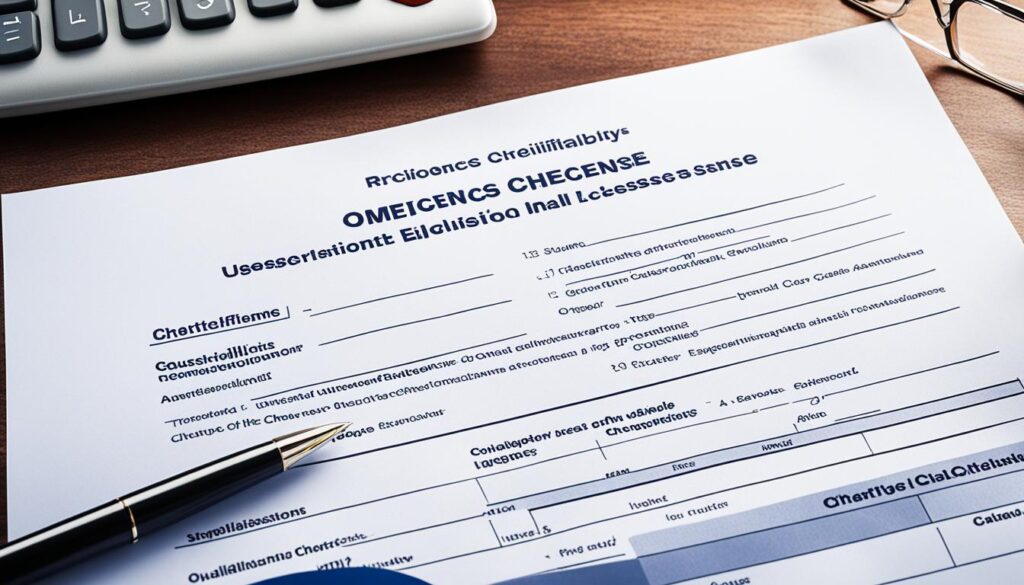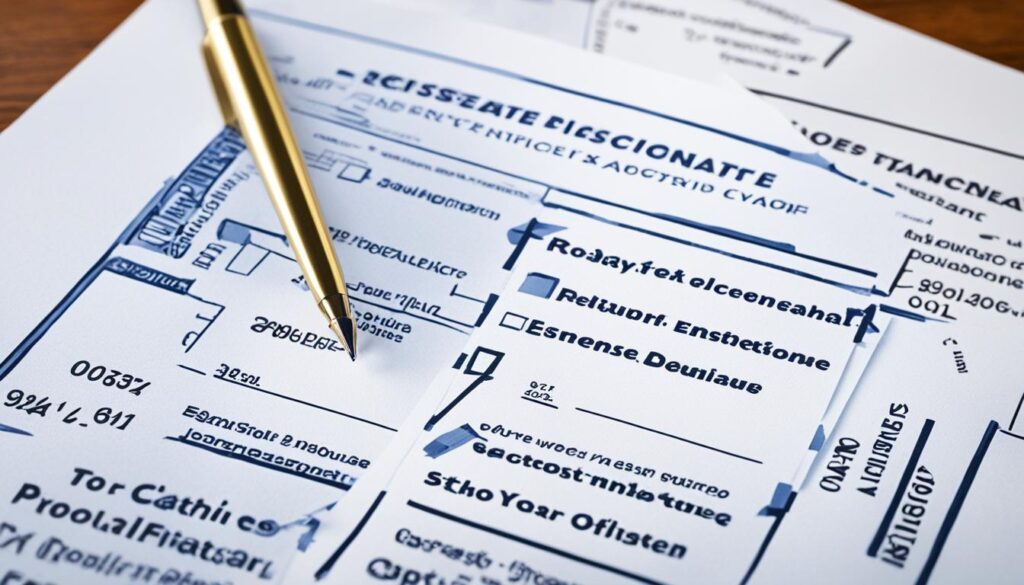Thinking about a job in real estate? To start, you need a real estate license. This guide will help you get your license, showing the steps and requirements.
Key Takeaways:
- To obtain a real estate salesperson license, you must pass a written examination.
- Age and residency requirements vary by state.
- Completing the required college-level courses is necessary.
- Once all requirements are met, you can apply for the license with the appropriate real estate regulatory agency.
Qualifications and Eligibility
Getting a real estate license depends on where you live. Each state has its own rules. Yet, there are some basics every applicant usually needs. Here’s a close look at what you must do to get your license.
Age and Citizenship
To get a real estate license, you need to be a certain age. In most places, that means being 18 or older. You also have to live in the United States legally. But, some states might ask for more from non-citizens. Make sure to look up your state’s rules.
Character and Integrity
Your behavior and trustworthiness matter a lot when trying to get a license. States check your background for any crimes. So, it’s very important to have a clean record.
Educational Requirements
Getting your real estate license also means getting the right education. This includes taking certain courses. These classes teach you about important real estate topics.
The Texas Real Estate Commission (TREC) is one example. They ask for classes like Real Estate Principles. The hours you need to study can vary from state to state.
The Image img and alt

Once you’re old enough, have a good track record, and finish the right education, you’ll take a test. This exam checks your knowledge of real estate.
After passing the test, you can start the application process. This means filling out forms and paying a fee to your state’s real estate agency.
When you get approved, you’ll have your license. Then, you can work as a salesperson or an agent. You’ll help people with buying, selling, or renting homes.
Find a Sponsoring Broker
With your license, it’s time to find a broker to work under. A sponsoring broker guides and trains new agents. This help is key to starting well in real estate.
To find a broker, contact large real estate firms. Also, network with people in the field. And check online sites that match new agents with brokers.
Table
| State | Age Requirement | Citizenship Requirement | Education Requirement |
|---|---|---|---|
| Texas | 18 | Citizen or Lawfully Admitted Alien | Qualifying education courses, including Real Estate Principles, Law of Contracts, and Real Estate Finance |
| California | 18 | Resident or Submit Application as Out-of-State Applicant | College-level courses such as Real Estate Principles, Real Estate Practice, and specialized courses |
| North Carolina | 18 | Resident or Non-Resident | Successful completion of a 75-hour Broker Prelicensing Course |
Table: Real Estate License Qualifications by State
Each state has its own real estate license rules. Always check with your state’s real estate agency. Be sure you understand and meet all requirements.
Application Process Overview
The journey to get a real estate license involves several steps. It’s vital to know what’s needed and stick to the rules of your state’s agency. This guide will walk you through each step to get your real estate license.
Step 1: Complete Prelicensing Course
Many states, like North Carolina, ask you to finish a course first. The course can be different in length and content, but it must be from an approved school. In North Carolina, you need to do a 75-hour Broker Prelicensing Course.
Step 2: Submit License Application
After finishing the course, you’re ready to apply for your license. You need to provide documents like your course completion proof and ID. Also, you’ll have to pay the application fee. Make sure you have everything ready to make the application smooth.
Step 3: Eligibility Determination
The licensing agency looks at your application to see if you can take the exam. You’ll get a “Notice of Examination Eligibility” if you’re good to go.
Step 4: Schedule and Take the Examination
With your eligibility notice, you can book your exam. You need to pay a fee to lock in your testing date. The exam covers a range of real estate topics. Be sure to study well using approved resources.
Step 5: Character Qualifications Assessment
Passing the test isn’t the end. The agency will check that you’re fit for the job by looking into your background. Stay honest, and disclose any important info during this check.
Step 6: License Issuance
If the background check goes well, you’ll get your license. This allows you to work as a real estate pro in your state. With your license, you’re ready to kick start your real estate career.
Keep in mind that the process can differ by state. Always check and follow your state’s exact requirements. By knowing and fulfilling all steps, you’ll get closer to your dream of having a real estate license.
| Application Process Steps |
|---|
| Step 1: Complete Prelicensing Course |
| Step 2: Submit License Application |
| Step 3: Eligibility Determination |
| Step 4: Schedule and Take the Examination |
| Step 5: Character Qualifications Assessment |
| Step 6: License Issuance |

Course Requirements
Each state has its own set of rules to get a real estate license. It’s key to know what these are. Make sure you finish the right real estate courses.
In California, you need to take three college courses. These are Real Estate Principles, Real Estate Practice, and one more from a set list. For this last one, you can pick from courses like Real Estate Appraisal or Property Management. The classes must be at an accredited school.
To get a license in Texas, you must complete 180 hours of real estate courses in a classroom. This includes learning about Principles of Real Estate, Law of Agency, and more.
Be sure to check what your state needs. You want to take courses that count towards your license. This approach will lead to success in getting your real estate license.

Comparing Course Requirements in California and Texas:
| State | Course Requirements |
|---|---|
| California |
|
| Texas |
|
Looking at the table, you can see how California and Texas differ in course needs. It’s vital to know your state’s requirements. This ensures you complete the right education for your real estate license.
Exam Process
Getting your real estate license means passing a big test. The exam is given by a company for the state’s real estate board. In California, Pearson VUE gives this test to students. You have to pay a fee to take the test. It’s about real estate rules, laws, and how things work.
To pass, you must study hard. Use books and online guides made just for this test. Each state has its own version of the test. It may have multiple-choice questions or tell you a situation to solve. This shows if you know about real estate well enough.
Each state is different in how many times you can try passing. Some states tell you if you passed or not. Others give you a score to see how well you did. Make sure to really understand how this test works and what you need to study.
Real Estate Exam Tips:
- Start preparing early by allocating sufficient study time.
- Focus on understanding key concepts rather than memorizing facts.
- Utilize practice exams and sample questions to familiarize yourself with the exam format.
- Create a study schedule and stick to it.
- Consider joining study groups or seeking guidance from experienced real estate professionals.
- Take breaks during study sessions to maintain focus and prevent burnout.

Finding a Sponsor
After getting a real estate license, the next step is to find a sponsoring broker. This sponsor is a must for those starting a career in real estate sales. For example, in Texas, a new licensee can ask for sponsorship from an active licensed broker. This is done online through the appropriate agency.
When the broker agrees to sponsor, the agent’s license becomes active. Then, the sales agent can begin working in real estate, getting help and guidance from their sponsor. The sponsor, a more experienced real estate professional, mentors the agent and shares tips for success.
Choosing the right sponsor is crucial for a successful entry into the real estate world. Necessary steps include researching the sponsor’s background and checking their reputation. This helps ensure a good working relationship and support for the new agent.
Benefits of Finding the Right Sponsor
- Access to guidance and mentorship from an experienced broker
- Opportunities to learn practical skills and industry best practices
- Networking opportunities within the real estate community
- Assistance in building a client base and establishing credibility
- Support in navigating the complexities of the real estate market
“Finding a sponsor who aligns with your goals and values can significantly impact your success as a real estate salesperson.” – John Smith, Experienced Realtor
Choosing a fitting sponsor grants individuals knowledge and resources for better career opportunities and lasting success in real estate.
| Key Considerations for Finding a Sponsor | Benefits |
|---|---|
| Experience and Reputation | Access to industry knowledge and best practices |
| Support and Mentoring | Gaining practical skills and guidance from an experienced professional |
| Network and Connections | Opportunities for business referrals and building a strong professional network |
| Training and Education | Access to additional training and educational resources |
Out-of-State Applicants
If you’re from a different state and want a real estate license elsewhere, you have to meet certain requirements. For instance, in California, non-residents can still apply. You must do what local applicants do, like pass the exam and finish college-level courses.
Doing your homework on the state’s rules is key. Make sure you follow every step for out-of-state applicants.
Now, let’s break down how out-of-state folks can get licensed:
- Start by looking up what you need to do. Each state has its own rules. So, dig deep into what the state you’re eyeing needs from you.
- You’ll likely need to meet the same standards as locals. This can involve, again, passing the test and doing the required coursework.
- Then, it’s time to apply. Follow the state’s paperwork process. Include all asked-for documents and pay any fees.
- Study for the test just like everyone else will have to. Use test prep materials to get ready.
- Some states ask for extra stuff, like fingerprinting or a check on your background. Make sure you cover all these extras.
- After you finish everything, including the exam, you’ll get your license. With that, you can start your real estate work in the new state.
Stick to the rules and you’re on your way to a new real estate career. Good luck!
Requirements for Out-of-State Applicants
| State | Requirements for Out-of-State Applicants |
|---|---|
| California | Pass the written examination |
| Complete required college-level courses | |
| Submit application and required documents | |
| Texas | Pass the written examination |
| Complete required education courses | |
| Submit application and required documents | |
| North Carolina | Pass the written examination |
| Complete required prelicensing course | |
| Submit application and required documents |
Continuing Education
Once you get your real estate license, it’s key to keep learning. This keeps you up to date with rules and new info. States like California and Texas ask you to take more classes every so often.
These classes teach you essential stuff for your job. They talk about ethics, treating people fairly, and updates in the law. You learn more, get better at your job, and understand what’s new in real estate.
Every state has different rules about learning more. You should always check for the latest rules. Doing these classes shows you’re serious about your job and getting better at it.
The Importance of Continuing Education
Learning more isn’t just a rule. It helps you do well in a competitive field. By taking classes, you can:
- Stay updated on laws that can affect your work.
- Get better at helping your clients.
- Make new friends in the business.
- Find tools to be successful.
Taking classes betters your career and helps you face new challenges in real estate.
Fulfilling Continuing Education Requirements
You have many options for your classes, like in-person or online. They fit into your busy life as a real estate worker.
Continuing education is an investment in your professional development and can help you stay ahead in a dynamic and ever-changing real estate market.
When picking classes, make sure they’re okayed by your state. Check if they give enough credit. Also, keep a record of what you’ve finished for future needs.
By doing these classes, you not only keep your license but also show you value learning. It’s a big part of being good at your job in real estate.
Conclusion
Getting a real estate license is key if you want a career in real estate. You need to meet requirements like being a certain age, having an education, and being of good character. The steps include taking courses, passing a test, getting a broker to sponsor you, and keeping up with learning more.
Rules might be different depending on the state. It’s crucial to research and follow your state’s real estate board’s rules. With a real estate license, you can explore many job opportunities and enjoy a thriving career in real estate.
A real estate license opens many doors, from residential to commercial to managing properties. It gives you the right to work with buyers and sellers legally. You can help people buy their dream homes or support community growth through building projects.
If you enjoy assisting others in finding their perfect home or want to influence community growth, a real estate license is an important first step. It opens up a world of opportunities in the real estate market.
FAQ
How do I get a real estate license?
To get a real estate license, you need to pass a test. Each state may have different age and residency rules. You also have to do certain college courses. After meeting these needs, you apply for your license. This is done by sending a form and fee to the state board.
What are the qualifications and eligibility for a real estate license?
Qualifications for a real estate license can change by state. But, you’ll often need to be a certain age, a U.S. citizen or resident, and show good character. A background check is usually part of this.
What is the application process for a real estate license?
Getting your real estate license involves a few steps. You must finish your educational requirements and send in your application and fee. The state will then check if you’re ready for the exam.
What are the course requirements for obtaining a real estate license?
The courses needed for a real estate license can vary. Most states ask for classes like Real Estate Principles and Real Estate Practice. They might also want you to take classes in things like Property Management.
What is the exam process for obtaining a real estate license?
The real estate license test is very important. It’s given by a special company chosen by the state. You must schedule and pass the test. To do this, study the courses well and use study guides.
How do I find a sponsoring broker for my real estate license?
After you’re licensed, you need a sponsoring broker to sell real estate. You can usually find a sponsor online through the state board. Having a sponsor is key for starting your real estate career.
What are the requirements for out-of-state applicants to obtain a real estate license?
To get a real estate license in a new state, out-of-state applicants need to meet local rules. Usually, this means passing the state exam and taking required classes. The rules might be similar to local ones.
What are the continuing education requirements for maintaining a real estate license?
After your license, you must keep learning and taking courses. Each state needs a certain number of hours of education in a period to renew your license. The classes cover things like ethics and latest laws.
How can I summarize the process of getting a real estate license?
Getting a real estate license means meeting various criteria. You need to be old enough, have an education, and show good character. Then, it’s about studying hard, passing an exam, finding a broker, and continuing to learn.


















